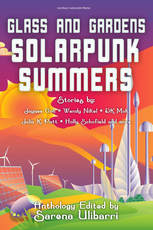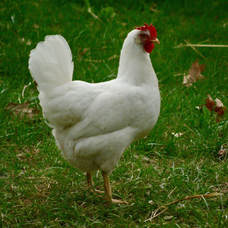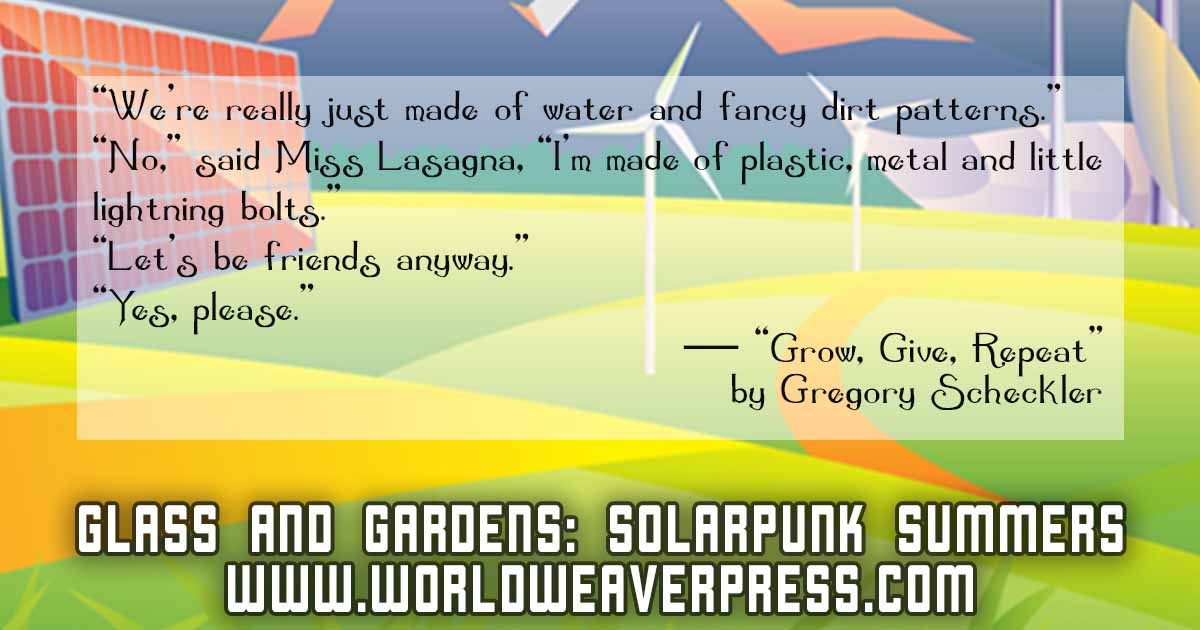 by Gregory Scheckler My neighbors' chickens wander our backyard. And they're adorable. I used to give them individual names. Penelope liked me, and ran up to me whenever I did garden or yard work, until one fateful morning I found an explosion of feathers on our lawn: dead Penelope, killed by a fox. I was crushed. I began to wonder what kinds of proteins would be better, ethically, and how might they affect the people who live and work near them? Little by little, such questions became part of the background for my story "Grow, Give, Repeat" featured in the anthology Glass & Gardens: Solarpunk Summers. What is the future of food? While writing the story, I researched developments in cultured meat (a.k.a. lab-grown meat). It's a surprisingly robust field. There's a wonderful, quick overview article at NPR: "Lab-grown Meat a Reality, but Who Will Eat It?" (2008) One vexing problem is where does all the energy come from to produce cultured meat? The large energy costs of cultured meats could have much bigger environmental impacts than growing live animals. Some vertical farm designs resolve this problem by incorporating cycles of plant life with water-filtering pools fish for food. This cycling from one resource to another is the big design puzzle for farming in general, as much as for any mode of new, sustainable food production. So, in "Grow, Give, Repeat," I embedded the main character in design problems, and provided characters with a system that relied on overlapping cycles of resources. The history of such thinking goes back to at least the 1890s, when French chemist Berthelot imagined a future for synthetic foods. (See "Foods in the Year 2000" in 1894 McClure's). Berthelot believed that "Herds of cattle, flocks of sheep, and droves of swine will cease to be bred, because beef and mutton and pork will be manufactured direct from their elements." By the 1950s it was common for authors and film-makers to rely on "food pills" and other condensed forms of nutrition, especially for space travel or planetary colonization, such as in Ray Bradbury's Mars tale, "The Wilderness" (November 1952, the Magazine of Fantasy and Science Fiction). From time-to-time, dehydrated foods like powdered drinks mixes (Tang!), edible algae and insects reappear as the great promise of sci-fi future foods. Sci-fi foods included the crushed insect bars in Snowpiercer (2013), cubbies of air-filtering and food plants in the series The Expanse (2012-), and the unforgettable talking cow who's happy to be eaten in Douglas Adams' Restaurant at the End of the Universe (1980).  Berthelot may not have been entirely wrong: new types of engineered foods have begun to appear in our local grocery store. My wife and I just tried a set of vegetarian burgers that were supposed to seem quite meat-like. It tasted like grilled cat food. And despite being made of pea protein, it was also very high fat, highly processed, and expensive -- not exactly healthy, nor good for ye olde household budget. And it was shipped a long distance to our store, which is not a good ecological solution. We have a long way to go before cultured meat is a reality. Meanwhile, food production intersects with local politics: a thicket of predicaments. While Berthelot may have imagined chemistry's contributions, he does not appear to have ever sat through a local zoning board meeting. In the story "Grow, Give, Repeat," political dynamics play out as social and economic unrest, including protests that directly affect the main character and her friends and neighbors. Her home town made some fairly stupid decisions, and some smart ones — just like we all do today. The real-world problems are big, but not impossible. Human population is increasing, but studied, practical solutions for better food production do exist. These include eating more plant-based foods, reducing use of food crops as biofuels, using drip irrigation rather than spray irrigation, and much more. A good introduction to how to feed our increasing populations can be found at National Geographic. But... do we have the social or political will to make such changes a reality? Massachusetts author-artist Gregory Scheckler crafts science fiction stories and cartoony artworks. His writings can be found at World Weaver Press, Crow's Mirror Books, the Berkshire Eagle, the Berkshire Review for the Arts, The Mind’s Eye, and Thought & Action. When he’s not writing or artmaking, he and his wife can be found skiing and biking the Berkshires, watching their neighbor's chickens, or tending their solar-powered home.
1 Comment
6/15/2018 10:34:32 am
I'm also interested in plant-based and cultured meat innovations. I'm vegan so more the former than the later (although it does remove some of the ethical and certainly the environmental/biohazard issues). There's energy around this in the Seattle area: https://thespoon.tech/scoop-seattle-food-tech-raises-1m-to-jumpstart-plant-based-meat-manufacturing/
Reply
Your comment will be posted after it is approved.
Leave a Reply. |
World Weaver PressPublishing fantasy, paranormal, and science fiction. Archives
February 2024
|
- Home
-
Books
-
All Books
>
- Beyond the Glass Slipper
- Bite Somebody
- Bite Somebody Else
- Black Pearl Dreaming
- Cassandra Complex
- Causality Loop
- Clockwork, Curses, and Coal
- Continuum
- Corvidae
- Cursed: Wickedly Fun Stories
- Dream Eater
- Equus
- Fae
- Falling of the Moon
- Far Orbit
- Far Orbit Apogee
- Fractured Days
- Frozen Fairy Tales
- Glass and Gardens: Solarpunk Summers
- Glass and Gardens: Solarpunk Winters
- Grandmother Paradox
- Grimm, Grit, and Gasoline
- Haunted Housewives
- Heir to the Lamp
- He Sees You When He's Creepin': Tales of Krampus
- Into the Moonless Night
- Jack Jetstark's Intergalactic Freakshow
- King of Ash and Bones (ebook)
- Krampusnacht
- Last Dream of Her Mortal Soul
- Meddlers of Moonshine
- Mothers of Enchantment
- Mrs Claus
- Multispecies Cities
- Murder in the Generative Kitchen
- Recognize Fascism
- Scarecrow
- Sirens
- Shards of History
- Shattered Fates
- Skull and Pestle
- Solarpunk (Translation)
- Solarpunk Creatures
- Solomon's Bell
- SonofaWitch!
- Speculative Story Bites
- Trenchcoats, Towers, and Trolls
- Weredog Whisperer
- Wolves and Witches
- Anthologies and Collections
- Novels
- Novellas
- Fairy Tale
- Fantasy
- Romance
- Science Fiction
- Urban/Contemporary Fantasy
- Young Adult SFF
-
All Books
>
- Blog
- About
- Contact
- Press / Publicity
- Newsletter Signup
- Privacy Policy
- Store


 RSS Feed
RSS Feed